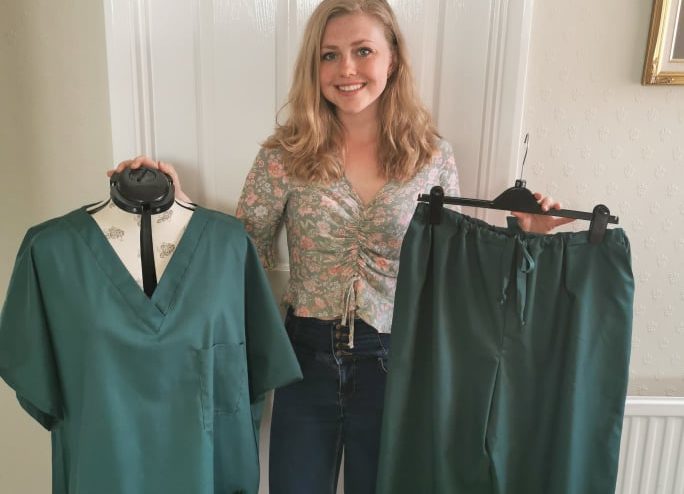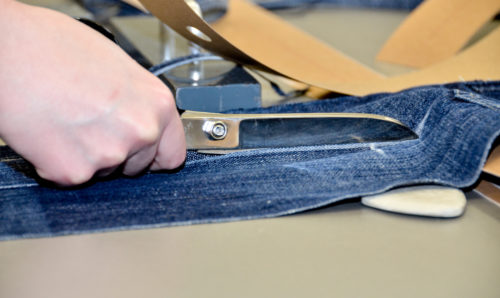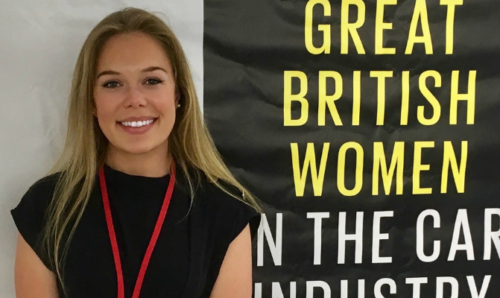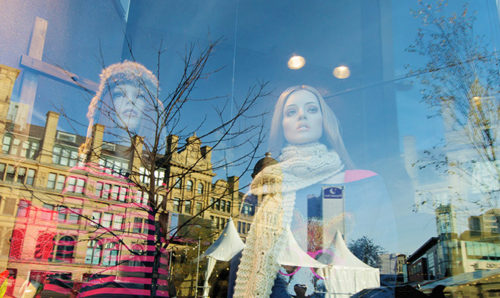From sewing scrubs to Royal Charter Prize nominee: our alumni Olivia-Faye Dickinson
Alumni Materials science Student experience Undergraduate 29th March 2022
We caught up with Olivia, our MEng Materials Science and Engineering alumni. Back in 2020 and while still studying, Olivia has taken on sewing scrubs for NHS staff during the COVID-19 crisis. Since then, Olivia has graduated and was nominated for the Royal Charter Prize.
Hi Olivia, it’s lovely to catch up with you again! Tell our readers a bit about you.
I’m Olivia-Faye Dickinson, 22, from Burton-on-Trent, Staffordshire, England.
I studied MEng Materials Science and Engineering at Manchester and graduated in June 2021. I started by studying on the Materials Science and Engineering with Textiles Technology course but became interested in biomaterials and polymers, as well as textiles, as the course progressed so I moved to the general Materials Science and Engineering course.
Congratulations on your recent shortlisting for the Royal Charter Prize! Tell us a bit more about your experience.
I was nominated by The University of Manchester when I finished my degree. The Institute of Materials, Minerals and Mining (IOM3) contacted me in the autumn to say I had been shortlisted and was invited for an interview, followed by the awards and new fellows dinner.
I went to London to the IOM3 headquarters for an interview where I had a one-hour conversation with two metallurgists about my time at Manchester, my interests in materials science and sustainability, my master’s research project and my future plans, and attended the awards ceremony shortly after. I had the opportunity to talk to other shortlisted graduates and fellows of the Institute which was a great experience. Unfortunately I didn’t win, but I was one of a few people shortlisted for the award which I feel pleased with, something I never imagined happening to me. It made me realise how my hard work is paying off and that I am capable of achieving a lot more than I thought, motivating me for my future research.
Take us back to your time at Manchester and tell us a bit about your final year, and the impact COVID-19 had on your time and studies.
Before COVID-19 broke out, I was in the process of a visa application to go to The University of Sydney to complete my master’s research project with the Neto group on mimicking a desert beetle to create water capture surfaces for help within droughts. This trip was cancelled due to COVID-19 and I completed my master’s work in Manchester. Despite lockdown, I was able to continue my laboratory work but had only 5 weeks of laboratory time and limited access, so I did some work at home too. I built a contact angle measurement home set up in my kitchen with equipment from Thor Labs (measuring how hydrophobic/hydrophilic the material is – how waterproof it is) and did some time-lapses of my samples too. I felt so lucky to have the opportunity to go into the laboratories during the COVID-19 restrictions and that the University kept the libraries and study rooms open so I could have a change of scene for my work.
Du ring the first lockdown in England, I worked with a group of around 40 seamstresses and we made over 900 sets of scrubs, as well as wash bags and headbands (to hold facemasks so they don’t irritate behind the ears) for our local hospitals. I was sent cut out sets of scrubs which I sewed from start to finish at home, alongside finishing my third year online. I found it motivating and it kept me busy so I felt productive and a bit distracted during the first few dull months we all had; whilst I know it helped a lot of NHS workers, it also helped my mental wellbeing during this time.
ring the first lockdown in England, I worked with a group of around 40 seamstresses and we made over 900 sets of scrubs, as well as wash bags and headbands (to hold facemasks so they don’t irritate behind the ears) for our local hospitals. I was sent cut out sets of scrubs which I sewed from start to finish at home, alongside finishing my third year online. I found it motivating and it kept me busy so I felt productive and a bit distracted during the first few dull months we all had; whilst I know it helped a lot of NHS workers, it also helped my mental wellbeing during this time.
Tell us a little about your career post-university, and the role you’re in now?
I am now a PhD researcher with a joint studentship at The University of Bath and Monash University (Australia). I am on the Bath Monash Global PhD Programme in Sustainable & Circular Technologies funded by the Centre of Circular and Sustainable Technologies. My project title is Peptide Polymer Fibers: novel structures, syntheses and applications. I am working on peptide polymer fibers, specifically an elastomer found in insects called Resilin, aiming to synthetically biomimic this peptide to produce more sustainable and functional fibers for use in textiles. As the project progresses, there may be possible uses in medical applications such as wound dressings, heart valves, etc.
I have also joined the public engagement committee in the Centre of Sustainable and Circular Technologies to voluntarily teach the public about sustainable research in science. This can be with schools or public stalls for all ages at markets, events, and festivals.
Reflecting on your time at Manchester, what did you enjoy most about the course?
My dissertation – I completed a project on the structural coloration of textiles with Dr Ahu Dumanli-Parry, to improve the sustainable coloration of textiles and functionality within medical applications too. I did some laboratory work and some home experiments due to the lockdown. I had three months of intensive research in this area, and this is where my passion for sustainable textile and biomedical textile research ignited.
And the wider University?
I was part of the University of Manchester swimming team who were a great part of my university life and met a lot of amazing people, competed for the University and exercised with them each week. I also worked as a student ambassador and PASS leader which I found rewarding, helping out those who are in the position I was in previously.
What are your thoughts on Manchester as a city?
I think it was an amazing experience to live in Manchester. There’s so much going on and whilst it was quite daunting at first, being from a small town, I learnt a lot of things from living in a city. I never had a ‘boring’ week and I love how diverse the city is. I met people from a wide range of different countries and backgrounds and with different beliefs, who I learnt a lot, it opened my eyes to the differences around the world.
What would you say to anyone considering coming to The University of Manchester to study?
It will be a great experience, embrace the extracurricular opportunities to meet a range of people, try and learn new things and network, within sports, trips, jobs, volunteering, societies, etc. Talk to the academic staff regularly, you may find out about a new opportunity you had never considered before. If you find something that sparks an interest for you, then explore it and utilise the University with its resources and connections.
AlumniBiomaterialsMaterialsMaterials ScienceStudentsThe Department of MaterialsUndergraduate





Leave a Reply
You must be logged in to post a comment.